Back to n5bf/6 ham radio page.
n5bf-at-amsat-dot-org
Last Update: 2010 June 11, 2012 November 16, VHF 11 Award
Amateur radio operators participate in many operating events aimed at testing radios, installations, operating techniques, stamina, and learning just what radio will do. There are awards programs for various geographical, political, spectral, and technological achievement and there are weekend rallies that are taken with various degrees of seriousness by the various participants, all the way from "full bore" to "just get on [the air] and give out a few points." I've been in all categories from time to time, but have yet to make a "clean sweep" in Sweepstakes. There are sevel "N-1" cases, however, and accumulated over several contests, I have worked all 80 US/Canadian sections.
Why do I do any contesting? It relates to Gooch's Paradox -- "Things not only have to be seen to be believed, but also often have to be believed to be seen."
Over 30+ years in ham radio, my attitude about contesting has evolved to this: It's a coordinated time for hams to get on the air and see what their stations will do. You are going to have a lot of other stations on the air so if your station will do anything, this is the way to find out. Comparisons with "last year" are also helpful (though muddied by the propagation variable).
I like soldering in balance with operating. It's easier to just get on the air and talk than it is to start a new project though, so I usually try to focus on the building projects first. But, when contest time comes around, let's see how that new amplifier (or whatever) really does. Though I like to keep it all low key, I have been known to stay up all night to get that new amplifier finished for the contest tomorrow (today). (See Brickette )
I remember the month I spent putting up a "160 foot dipole as high as I could get it" to try to get on the Top Band test for the first time. It would have been 1993. Notice no entry below for 'Top 1993. Yes, 160 feet. No, it didn't tune well. What was it in the end, 25-30 feet high and draped all over the place? Lots of stations were on the air, but I could only hear close in, out to about a hundredmiles, and only the ones that were 40 over 9 to me were even nibbles to my calls and I didn't complete any contacts at all. I could have read in a book or calculated with EZNEC that this antenna wouldn't have worked (well, no, this was before EZNEC) but I wouldn't remember that lesson today except that I actually did it. After that I went out and bought a GAP DX-IV. It's not the greatest antenna on 160 (I'm told) but it gets out to my standards. That is, I can work the ones I can hear, even at S-5. Hey, I've worked JA on Top Band!
And nearly anything will justify another full bore somewhere. One year I had some trees, that had previously been antenna supports, taken out and had put up new antennas. That was reason to do the contest and see how different it was. New amplifier? New mod to an old one? New antenna? Rotator? Keyer? Software? These are all reasons for contesting. Sharpen skill, yes, but get familiar with how that box or device works too.
Is it about winning? If it was about winning I would never enter. It is about taking advantage of all those other stations being on the air same weekend to try that thing out!
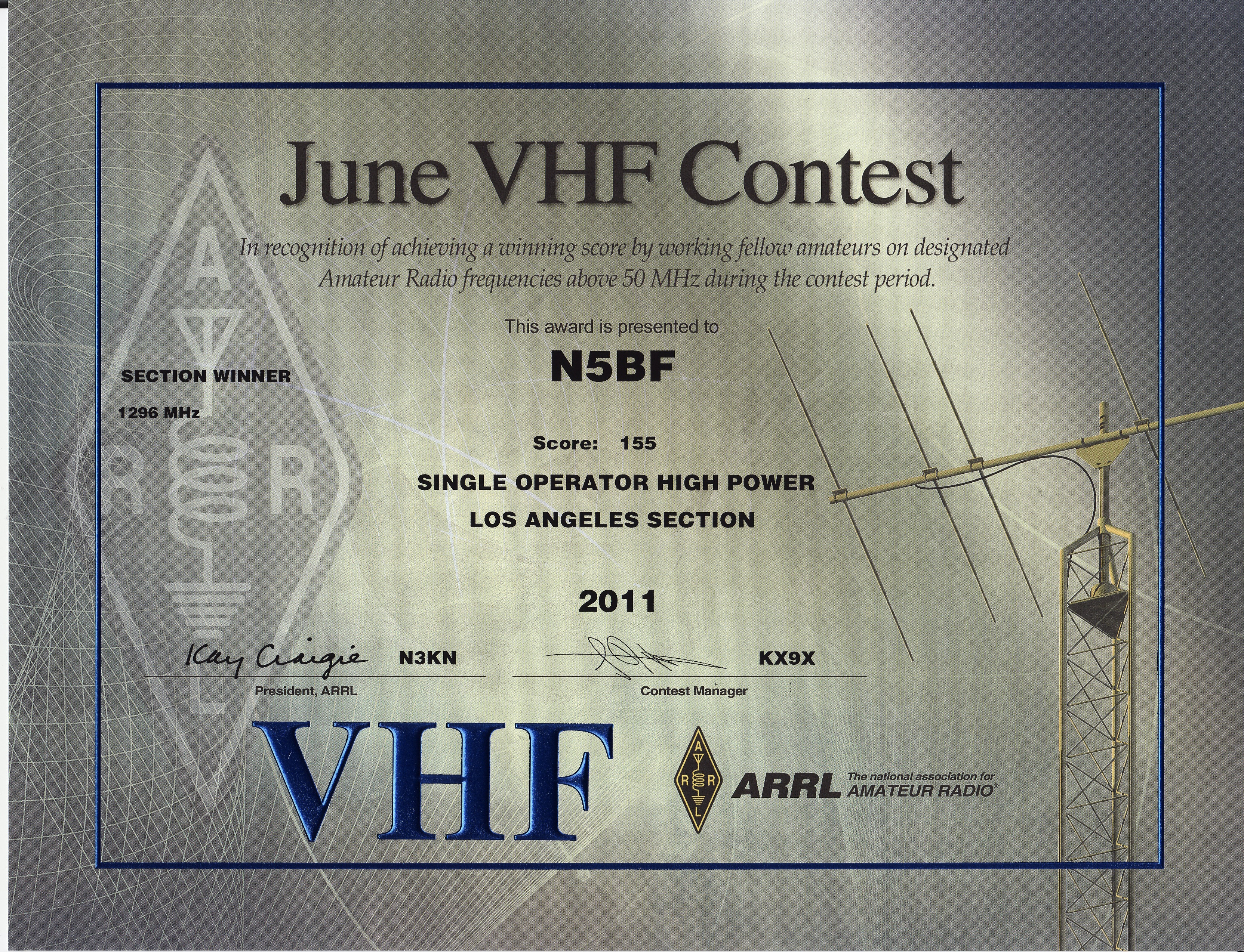
| To the best of my recollection
and records, these are the contests in which I've participated to the
extent of filing a formal entry with the sponsoring organization.
For those done in the computer era there is a link to the log that can
be searched with a simple text search. For those where results
are available online and I've been able to locate them, they are linked
here. I've done eqsl for some years and will ultimately respond to any QSL requests there, typically within six to twelve months since such things, though an obligation within our polite hobby, are no longer my prime focus. There is also an intention to put relevant material into Logbook of the World but I haven't even looked into what would be involved yet. I haven't done strict (non contest) logging since December 1999. Everything was paper, or non-compatible computer formats before that and it has been at least 20 years since I had a goal of computerizing everything I'd ever done since 1972 (then WN5GRZ and WB5GRZ). I don't really intend to ever operate in a mode where I would do formalized, computerized logging, but I will eventually figure out how to enter individual QSOs that are important to me or someone else, into these electronic databases. Bottom line is this. I'll QSL anyone from any QSO I can actually confirm. If you think you worked me and don't find the reference in any of this here, e-mail me and I'll look it up in my old paper logs. If I can find them. Where available, scores are summarized as total/multipliers/QSOs, for SS, VHF, etc. total/bonus/QSOs, for FD. Unofficial contest totals, 1993 to date: 839795 Points 8727 QSOs ARRL Phone SS 2009 9804/43/114 results ARRL CW SS 2009 67792/76/446 results ARRL VHF QSO Party 2009 June, 161/23/7 B results ARRL VHF Sweepstakes 2009 January, 18/3/6 B results >> First Place, LAX, Single Op. Low Power. ARRL SKN 2009, 4 After years of DSP-10 (2 meters) only, and the removal of two trees, decided to rework my HF antennas and test them in the November SS. A ham should be on HF for emergency preparedness and general usefulness in support of whatever else s/he does. Given their setup, a contest like FD or SS is a good way to find out how it works, compared to other configurations, propagation, locations, or operators. 2009 January 16-19, put the 15/17/20 dipoles back up but was not happy with their loading, location, unsightliness, and disrepair. 2009 July 2, took them down and stored them. Moved the huge TV antenna into the attic where it works better, lowered the discone, and hung the MFJ-1786 in the upper attic. Current configuration is TS-680 -> Swan Mk II -> Gap on 160/80/40/20, and TS-680 barefoot to MFJ-1786 or Gap via tuner on 30/20/17/15/12/10. Six meter antenna is whip on discone. Discone otherwise covers 140-1300 MHz. And 2M12 beam on rotator for DSP-10. I would have to be primarily HF and go to a beam, or some other "lots of work" installation to improve this. 2009 June 15, initiated a conversation with W0RPK about buying his Swan Mk II that has been operational in my shack for about 15 years. If I returned it to him he would just sell it locally, so I bought it and left it where it was. Below 30 MHz this is considered the final HF configuration for now. Tests in the fall contests listed above. Also started a list of contacts on each band/antenna (various modes) to get some longer-QSO experience. Tried to distinguish between Gap at 1000 W and discone at 100 W in the CW SS. The discone hears more noise so is less preferable for listening but the Gap is poor on 20 and it turned out there were contacts that were exclusive to each. Did not intend to work the VHF June event, but on hearing, then working both DM05 and CM94, thought I had to fill it out for that chance at seven grids. ARRL FD 2008 102/50/26 results ARRL VHF QSO Party 2008 June 205/5/41 B results >>> won >>> ARRL VHF QSO Party 2007 September 28/4/7 B results ARRL FD 2007, 120/50/14 results ARRL VHF QSO Party 2007 June, 132/6/22 B results ARRL VHF Sweepstakes 2007 January, 56/4/14 B results >>> won >>> ARRL SKN 2007, Did not turn in an entry, not shown in results, but still got only known "Best Fist" vote ever! ARRL VHF QSO Party 2006 September, 75/5/15 B results >>> won >>> ARRL FD 2006, 88/50/16 results ARRL VHF QSO Party 2006 June, 162/6/27 B results ARRL VHF Sweepstakes 2006 January, 120/6/20 B results At this point I was winning things on the DSP-10, based on the same "more categories than entrants" criteria discussed below. Also, starting in 2006, I developed (Xcode) my own log processing program. Now I keep logs in a text editor, using the editor's search feature for live dup checking. Once the contest is over, I use my program to read the text and produce Cabrillo for the ARRL online submissions and a text version linked here. I also edit comments about busts into those outputs for your amusement. No, nothing about automation keeps me from busting a QSO once in a while. ARRL VHF QSO Party 2005 September, 198/6/33 B results >>> Won the Section! >>> ARRL FD 2005, 24/0/12 results ARRL VHF QSO Party, 616/11/50 results 2005 June ARRL SKN 2005, 3 results It was in 2005 that I started contesting only on the DSP-10 as a way of checking it out and not having other contests take time away from working on its goals. Also, somewhere here I stopped using TrLog because it was squirly under VPN. ARRL 160 Test, 2004, 960/16/31 results ARRL CW SS 2004, 8/2/2 results, Rockmite only (two QSOs, tough!) ARRL SKN 2004, 7 (Rockmite) results ARRL 10 Meter Test 2003, 378/7/14 results ARRL 160 Test 2003, 552/12/26 results ARRL CW SS 2003, 20832/62/165 results >> Won the Contest (single U) >>> Somewhere around here log autochecking came in, busting everybody back by a bunch of points. Next year, everyone was more careful. My standard average seems to be about 2% busts resulting in a 4-5% reduction in score. ARRL 10 Meter Test 2002, 21518/53/117 results ARRL 160 Test 2002, 8432/31/137 results - last attempted "full bore" >> First Place, Single Op., High Power, LAX. ARRL Phone SS 2002, 9540/45/108 results - tiring of phone contesting. W6GL hosted an SS Phone party. ARRL CW SS 2002, 96252/78/625 results - the last "full bore" >> Won the Contest >> ARRL FD 2002 as KG6HCO/n5bf "?"585/200/48 results ARRL SKN 2002, results In 2002 I started winning, not so much due to any increased skill but because I was getting accustomed to how the swing of a full bore contest worked (and was therefore getting bored with it) but mostly because I was entering categories like "B" and "U"(high power and "unlimited" respectively) that few others entered, apparently. ARRL 10 Meter Test 2001, 2356/31/38 results ARRL 160 Meter Test 2001, 576/12/24 results ARRL SKN 2001, results Dad died here, 2000 December 9, making 2001 a slow year in all ways. ARRL 160 Test 2000, 4117/23/91 results This is the only known occasion where I appeared in the regional winners box at the summary page of the results. And, it was the "worst best" score in that box. >> First Place, Multi-Op. LAX (Multi-Op means "assisted by packet.") ARRL CW SS 2000, 76156/79/482 results >> First Place, Single Op Unlimited, LAX ("Unlimited" means assisted by packet spots.) ARRL FD 2000, 162/0/52 results ARRL VHF QSO Party 2000 June, 189/9/21 A results ARRL VHF Sweepstakes 2000 January, 504/14/27 ABCD results ARRL 10 Test 1999, 1634/19/28 results ARRL 160 Test 1999, 2000/20/50 results ARRL Phone SS 1999, 90288/76/594 results I didn't remember ever doing a "full bore" phone! ARRL CW SS 1999, 85424/76/562 results ARRL FD 1999, 242/0/155 results ARRL 160 Test 1998, 20088/54/180 results ARRL Phone SS 1998, 41328/72/287 results >> First Place, Single Op. High Power, LAX ARRL CW SS 1998, 63840/76/420 results >> First Place, Single Op. High Power, LAX evidence for QRP ARCI test of some sort ARRL FD 1998, 168/0/119 results ARRL VHF QSO Party 1998 June, 495/11/34 ABCDE results ARRL SKN 1998, 6 Somewhere around here I used EZNEC, in one of the older versions, to design up a new 15/17/20 parallel dipoles that could take a KW. This worked quite well and EZNEC predicted the very tuning problems that I encountered actually loading the wires. EZNEC also predicted dipole combinations that wouldn't work, saving me considerable time. (Hint: nothing works with 12 meters; just resigned myself to using a tuner on 30 and 12.) Also did a 10/6 dipole which didn't work near as well, also as predicted. ARRL Phone SS 1997, 6800/34/100 results with Katy Lou talking (future KG6HUI) ARRL CW SS 1997, 55024/78/362 results - might have been my own contest software ARRL FD 1997, 180/0/44 results ARRL SKN 1997 3 Somewhere around here, W0RPK loaned me his Swan Mark II which was used to help witih SS and eventually modified (open cabinet, switch, shut) for 160 on a "seasonal" basis for 160 Tests. ARRL 160 Test 1996, 6453/27/239 ARRL CW SS 1996, 30520/70/436 ARRL UHF Test 1996, 198/6/11 D Mt. Waterman and Buckhorn campsite ARRL FD 1996 42/0/21 ARRL SKN 1996 2 ARRL 160 Test 1995, 5940/30/198 "most fun" Best DX: ENY ARRL CW SS 1995, 29832/66/452 W6VIO "Important Emergency Activity" Contest ARRL FD 1995 2/0/1 "The Bust" Made only one QSO and still managed to bust the call. In today's system, that would net a score of "-2"! ARRL 160 Test 1994, 2691/23/57 first on Gap DX-IV at 4402 ARRL CW SS 1994, 29952/64/468 ARRL FD 1994 1044/0/522 moved from 4522 to 4402 ARRL SKN 1994 5 ARRL 10 Test 1993, 1920/15/35 ARRL CW SS 1993, 18480/60/154 fun, MFJ 1786 loop. QRP ARCI Test 1993 October 17, 21574/23/134 surveyed QSOs, average age -- 50. ARRL VHF QSO Party 1993 September, 518/14/37 ABCDE ARRL UHF Contest 1993 August, 192/4/14 CDE ARRL FD 1993, 480/0/96 Hiatus from amateur radio was last half of 1991. When I returned, I started doing contesting as a way of learning the capabilities of, studying, and "justifying" those radios. Before that all contesting was FDs. ARRL FD 1990, 6E Satellite and VHF-only with WB6VRN ARRL FD 1989, did the satellite station for W6VIO ARRL FD 1988, made one satellite QSO with W6VIO provided stn. ARRL FD 1987, two packet QSOs in Tucson while moving to SoCal. ARRL FD 1986, with K5TMS group near Ft. Davis, Texas ARRL FD 1985, Argonaut from apartment with #30 wire, 107 QSOs ARRL FD 1984, Visited HTTY site on Pt. bolivar ARRL FD 1983, At WB5FID, Taylor, Tx ARRL FD 1982, At K5TMS/5 on the Pecos River ARRL FD 1981, N5BF Argonaut, WB5FID, rhombics, Tomball land ARRL FD 1978, At WD5IAF Heart O Texas club, 20 CW all night shift. The phone guys were yelling "Idiots And Fools" all night. ARRL FD 1974, A few FD QSOs, mostly WB5FID before upgrade Tues. Or was that 1973? |
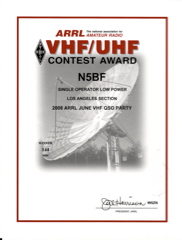 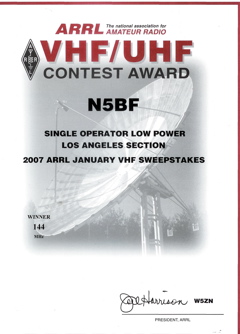 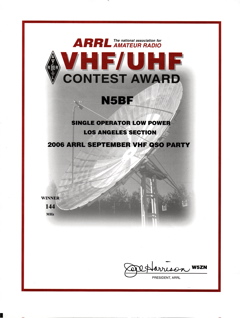 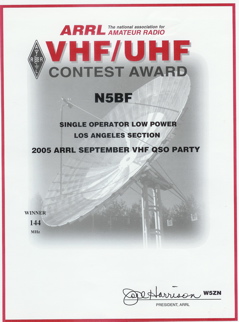 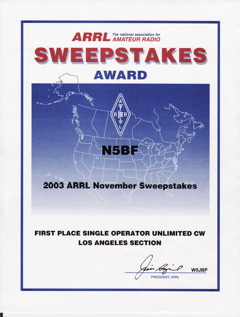 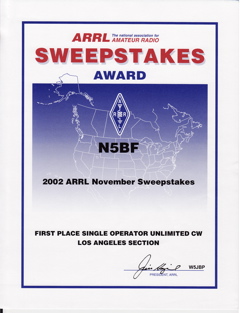 |